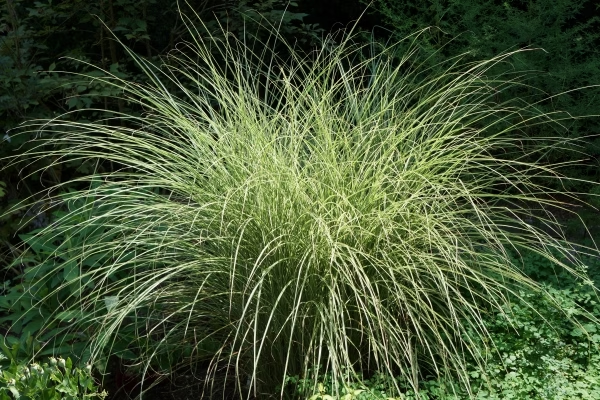
Maiden Grass
Botanical Name
:
Miscanthus sinensis
Plant Type
:
Ornamental grass
Seasons
:
Grows in spring, summer, and fall. Goes dormant in winter
Sun Level
:
Full sun (6+ hours) is ideal but can tolerate some light shade
Ideal Soil Temperature for Planting
:
60-70°F (15-21°C). Planting is best in spring and fall
Soil Type
:
Well-drained soil. It tolerates a range of soil types, including clay, loam, and sandy soils, as long as drainage is good. Amend heavy clay soils with compost or other organic matter
Hardiness Zones
:
5–9 (USDA)
Germination
:
Typically propagated by division or purchased as established plants. Seed germination can be slow and variable
P.H. Level
:
5.5 to 7.0
Water/Irrigation
:
Requires regular watering during its active growing season, including spring and summer. After the first planting, maiden grass must be thoroughly soaked to strengthen its roots. Once established, it can sustain itself throughout normal weather conditions, only needing extra care during drought or severe heat.
Fertilization
:
A light application of a balanced fertilizer in early spring before new growth begins is usually sufficient
Habit
:
Clumping, upright, and arching
Final Plant Height
:
4–6 feet (120–180 cm), depending on variety
Spread
:
3–4 feet (90–120 cm)
Spacing
:
3–4 feet apart for a clumping effect
Flowers
:
Feathery plumes in late summer to fall
Attracts
:
Birds, particularly for seedheads in winter
Uses
:
Ornamental grass in borders, screens, hedges, or as a focal point
Companions
:
Barberry, Hellebore, Boxwood, Black-eyed Susans, Purple Coneflower
Pruning
:
Cut back in late winter or early spring to about 6–8 inches
Toxicity
:
Not toxic to humans and pets
Pests
:
Minimal, but can occasionally attract aphids or spider mites
Diseases
:
Generally disease-resistant, but may suffer from rust in humid conditions
Fun Fact
:
Maiden Grass gets its name from the delicate, wispy flower plumes that resemble a maiden’s flowing hair
Expert Care Tips
:
- Water at the root level to prevent plant rust
- Avoid heavy pruning in the fall, let the plant stand over winter
- Mulch at the base in winter to protect against cold temperatures
- Divide plants every 2-3 years to prevent overcrowding and promote healthy growth
- Water regularly during the first growing season to establish roots
- Cut back old foliage only after new growth begins in spring to avoid damaging new shoots
Botanical Name
:
Miscanthus sinensis
Plant Type
:
Ornamental grass
Seasons
:
Grows in spring, summer, and fall. Goes dormant in winter
Sun Level
:
Full sun (6+ hours) is ideal but can tolerate some light shade
Ideal Soil Temperature for Planting
:
60-70°F (15-21°C). Planting is best in spring and fall
Soil Type
:
Well-drained soil. It tolerates a range of soil types, including clay, loam, and sandy soils, as long as drainage is good. Amend heavy clay soils with compost or other organic matter
Hardiness Zones
:
5–9 (USDA)
Germination
:
Typically propagated by division or purchased as established plants. Seed germination can be slow and variable
P.H. Level
:
5.5 to 7.0
Water/Irrigation
:
Requires regular watering during its active growing season, including spring and summer. After the first planting, maiden grass must be thoroughly soaked to strengthen its roots. Once established, it can sustain itself throughout normal weather conditions, only needing extra care during drought or severe heat.
Fertilization
:
A light application of a balanced fertilizer in early spring before new growth begins is usually sufficient
Habit
:
Clumping, upright, and arching
Final Plant Height
:
4–6 feet (120–180 cm), depending on variety
Spread
:
3–4 feet (90–120 cm)
Spacing
:
3–4 feet apart for a clumping effect
Flowers
:
Feathery plumes in late summer to fall
Attracts
:
Birds, particularly for seedheads in winter
Uses
:
Ornamental grass in borders, screens, hedges, or as a focal point
Companions
:
Barberry, Hellebore, Boxwood, Black-eyed Susans, Purple Coneflower
Pruning
:
Cut back in late winter or early spring to about 6–8 inches
Toxicity
:
Not toxic to humans and pets
Pests
:
Minimal, but can occasionally attract aphids or spider mites
Diseases
:
Generally disease-resistant, but may suffer from rust in humid conditions
Fun Fact
:
Maiden Grass gets its name from the delicate, wispy flower plumes that resemble a maiden’s flowing hair
Expert Care Tips
:
- Water at the root level to prevent plant rust
- Avoid heavy pruning in the fall, let the plant stand over winter
- Mulch at the base in winter to protect against cold temperatures
- Divide plants every 2-3 years to prevent overcrowding and promote healthy growth
- Water regularly during the first growing season to establish roots
- Cut back old foliage only after new growth begins in spring to avoid damaging new shoots
Written by Salome Wapukha – https://www.linkedin.com/in/salome-wapukha-556700193/

